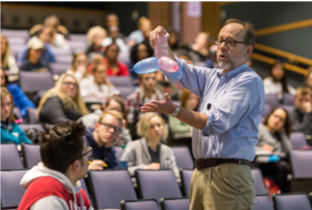We are told that in teaching the very first few minutes of the first day of the semester of any class are the most important. These first few minutes set the direction and demeanor for the rest of the term. Students look at the professor as he (or she) first walks in and they say to themselves: "I don't care how much he knows, but I do want to know if he cares."
Well, Keith cares!

Photo by Liz Kaye, IU Communications
And Keith Anliker cares deeply about his teaching and about students as evidenced by the variety of methods he uses in his teaching, by the introduction of technology where appropriate, by the time he takes during office hours, by his continued search to find the secret of how students think, and by his optimistic attitude. When he overhears students saying "I hate chemistry, but I love Professor Anliker," he knows he has done something right.
Research shows that the ease of receiving good teaching evaluations is inversely proportional to the size of the class, to the number of students required to take the class, and to the number of majors represented in a class. It is always most difficult to get good evaluations in lower level classes. While he has taught upper level classes, Keith's major teaching responsibility is with large (hundreds of students) classes where most students are required to take the class, and many majors are represented. Naturally students' initial attitude coming into such a class is not the greatest. So, why, despite of all these roadblocks, did Keith Anliker receive the Chancellor's Award for Excellence in Teaching? Read on.
Keith is a searcher. He searches for ways to connect with students on a personal level by, for instance, the use of extended office hours where students feel free to open up about their personal issues. He sees how students struggle. One way to help students might be to make the course easier, but this would keep them from acquiring the knowledge and skills needed in life beyond college. He searches for alternative ways of teaching - an especially difficult task given the vast gulf in abilities among students. His solution is to be optimistic and to show students that their success matters to him.
What has brought him to this point? The answer is a fortuitous coincidence of a parade of superb models in teaching starting in his grade school, middle and high school, and in college. Since his employment in the chemistry department in 1990, he has been blessed by the many opportunities given to him that have advanced his career where people have placed "a ton of faith" in him. He has been appointed to important committees, participated in professional development, took part in the Gateway Scholars Program, where he worked in a fabulous incubator and conduit for improving teaching practices, was elected to the IU-wide FACET (Faculty Academy on Excellence in Teaching) program, and has worked closely with the Center for Teaching and Learning. He was able to interact with many colleagues across the campus and expand his horizons as a teacher. As a lecturer Keith's primary job is teaching and thinking about teaching and learning. Still, he does have numerous publications and has a funded proposal to his credit.
Story written by: Erwin Boschmann